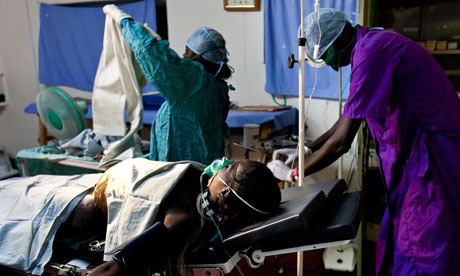Why the beleaguered hospitals of South Sudan are out for blood
A blood shortage caused largely by the misgivings and cultural taboos of potential donors is costing lives in South Sudan

Pregnant women are among those most affected by the shortage of blood donors afflicting South Sudan. Photograph: Trevor Snapp/Merlin
A small fridge in the corner of Juba teaching hospital's laboratory is the only blood bank in South Sudan. The world's newest country has some of the worst health statistics in the world.
Health workers say a lack of blood is the main cause of mortality at South Sudan's main hospital, which is extremely under-resourced. Staff face the anguish of having to watch patients die who could be saved.
"Sometimes they bleed until they die and we cannot do anything about it," said Wani Mena, head of the hospital.
"The first cause, the major cause, of maternal mortality in our department is bleeding," said Chuol Kuma, an obstetrics and gynaecology consultant.
While the rest of the hospital is sometimes left for days without power due to frequent cuts, capacity to keep more blood is hampered by only having a small fridge in the laboratory, which is the only room with a back-up generator.
"The blood bank we have is a very small refrigerator. It only takes around 50 units of blood. This is not enough," Kuma said.
A 20-year-old mother of two recently died after suffering complications from a late miscarriage.
"She needed an immediate blood transfusion [but] she got the blood late and died," he said.
The woman, like many others who enter the hospital, was already anaemic.
"The need for blood is so great in this place because of injuries. Anaemia is one of the most common presentations to our hospitals, both of women who are pregnant and for those who have malaria … and sometimes they die from it," said Mena.
Most of the time, the small amount of blood in the family-sized fridge cannot be touched even in emergencies, as it has been donated for specific patients due for surgery.
"The system that exists is that somebody gets sick, relatives come and donate blood. That is not a good system. We should have a stock of blood that we can give to any patient in need of it, and immediately," said Mena.
Cultural taboos and a lack of awareness about the risk-free benefits of giving blood also mean that getting relatives to give blood to save a life is often a struggle staff do not win.
"In some tribes, somebody cannot, for example, give blood to his in-law, or somebody cannot receive blood from a foreigner, things like that," said lab supervisor Charles Stanley Mazinda.
Other staff say families avert their eyes or want to know their loved one will make it before committing themselves.
Amin Gerald, a nurse at Torit hospital, about four hours' drive from Juba, said he had come to give blood for his wife. He understands the importance of giving blood, but would not do it for a stranger.
Gerald says he often comes across people who believe that giving blood will make them ill or weaken them, or that blood should never be mixed as it could kill the patient.
Technician Charity Ritti said the laboratory used to divert blood to emergency patients whose relatives promised to donate afterwards; when they did not come back, staff faced a backlash from donors.
"The owners of the blood will come and quarrel and sometimes they even want to beat us," she said.
Ritti is concerned that often the bank only has one unit of key blood types, but says changing people's mindsets to build up reserves is extremely difficult.
"They are afraid of donations – we have people coming here from Kenya, Uganda and Khartoum [Sudan] and giving blood … but our people here cannot face free donations," she said. "Sometimes we screen them, then we say 'Go and have breakfast'– and they never come back."
Hospital staff say awareness campaigns and better medical education are needed.
"There's just not a lot of cultural education about giving blood and still being healthy," said Matthew Fentress, an American doctor working at Juba Hospital.
In addition, Mazinda said getting people to the blood-screening stage was a challenge, as people feared finding out they were HIV-positive.
"Sometimes we screen some blood donors, and when they are [HIV-]positive, we tell them to go to the VCT centre down the road, but some of them don't reach there," he said.
The government is planning to build a national blood bank this year holding up to 200 pints (113 litres).
Meanwhile, doctors from the Harvard Initiative in Massachusetts have set up a "virtual blood bank" to try to beat storage and power problems. The bank is made up of a database of pre-screened volunteer donors who are willing to come in and replace a unit of their blood type.
Fentress said this would free up blood for emergencies and when the hospital cannot get blood from patients' friends and families.
"Right now we're really focused primarily on foreigners, as their attitudes are already changed," he said.
The hospital is advertising on the internet, and in community centres such as churches, until a government campaign hopefully ensures South Sudan's first "real" blood bank is filled.
"It is just the beginning and I hope it will succeed," said Kuma. "But I think they need assistance from the communities. There must be medical education or health education for the communities so that they accept to come and donate freely so that we may have enough blood in our blood bank."
